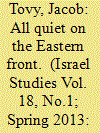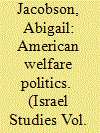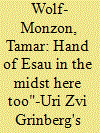|
|
|
Sort Order |
|
|
|
Items / Page
|
|
|
|
|
|
|
| Srl | Item |
| 1 |
ID:
119460


|
|
|
|
|
| Publication |
2013.
|
| Summary/Abstract |
The article reviews and analyzes the measures taken by Israel from the beginning of 1951 until the middle of 1956 in its attempt to extract collective compensation (referred to in Israeli terminology as shilumim and hereinafter as "reparations") from the GDR (East-Germany). Existing research on the subject has revealed that as of yet there has been almost no discussion of it. Only two sources have dealt in a substantive manner with Israel's attempts to obtain reparations from the GDR during 1951-56: Angelika Timm in a sub-chapter to the issue in Jewish Claims against East Germany, and Michael Wolffsohn's article, "Das Deutsch-Israelische Wiedergutmachungsabkommen von 1952 im Internationalen Zusammenhang." However, these two writers analyze the subject only briefly-each devoting only 8 pages to the issue, based on sources cited in some 30 footnotes. In contrast, this article provides an in-depth understanding of the subject, including all the aspects from different perspectives, some of which are not discussed in the above-mentioned writings. First and foremost, the article reviews all of the actions taken by Israel regarding this subject, while focusing on the connection that was made between the two Israeli claims for reparations: from the GDR and from FRG (West-Germany).
|
|
|
|
|
|
|
|
|
|
|
|
|
|
|
|
| 2 |
ID:
119459


|
|
|
|
|
| Publication |
2013.
|
| Summary/Abstract |
This article discusses American involvement in Jerusalem during WW I, focusing on two American institutions active in the country and city at the time: the U.S. consulate and Consul Dr. Otis Glazebrook, and the American Colony in Jerusalem, an unofficial but important American institution. By examining these official and unofficial American "agents", this paper argues that the American involvement in the city can shed light on America's "welfare politics" in Palestine, whose traces can be tracked down until today. The "politics of welfare" offer many insights not only on war-time conditions in Jerusalem, but also provide a glance into American motivations of support and involvement in other areas in the Middle East. Using a variety of sources from the records of the American consulate and the American Colony, this paper analyzes the close connection between welfare, power, and political influence, demonstrated by the American case.
|
|
|
|
|
|
|
|
|
|
|
|
|
|
|
|
| 3 |
ID:
119462


|
|
|
|
|
| Publication |
2013.
|
| Summary/Abstract |
Recent years have seen a considerable surge in academic work published on the Palestinian Arab minority in Israel (PAI). Strikingly, the growing interest has come from a variety of disciplines in the humanities and social sciences, including political science, security studies, sociology, and history.1 Given the vast array of pertinent questions that have arisen in relation to the Arab minority over the last decade, it is not surprising that the study of this minority has drawn interest from numerous directions. This multidisciplinarity-not to be conflated with interdisciplinarity-carries with it considerable potential for comprehensive knowledge accumulation that transcends traditional boundaries by linking diverse analytical approaches and perspectives.2 There is little doubt that political scientists and sociologists can learn from information gathered by historians, while the latter's interpretation of historical events can improve by being informed by comparative theories developed by disciplinary social scientists. Linking contributions from different disciplines can facilitate both increasing our knowledge of detail as well as improving our ability to make sense of the details and gain a better understanding of the general picture. Posed in different terms, incorporating insights from multiple disciplines increases the potential for better seeing the forest for the trees.
|
|
|
|
|
|
|
|
|
|
|
|
|
|
|
|
| 4 |
ID:
119457


|
|
|
|
|
| Publication |
2013.
|
| Summary/Abstract |
This article treats the topic of political cartooning and the evolution of a genre during the early years of Israeli statehood. It focuses particularly on the work of two prominent cartoon artists, Friedel Stern and Kariel Gardosh (Dosh), who made their careers in Israel in the 1950s and '60s and whose politically charged images have been sanitized over time. It looks at how attitudes towards certain imagery have changed so that political commentary that was seen as relevant and acute during early statehood eventually lost its political edge through historical handling and revision. These two cartoonists provided strong visual symbols of early Israeli national identity, which invariably had political motivations, and yet their legacy as political commentators during a crucial period in Israeli political history is often overlooked.
|
|
|
|
|
|
|
|
|
|
|
|
|
|
|
|
| 5 |
ID:
119458


|
|
|
|
|
| Publication |
2013.
|
| Summary/Abstract |
The article examines the genesis, in the late 1910s and early 1920s, of the current Zionist periodization, which separated the early decades of Zionist history into distinct immigration waves [Aliyot], and numbered them from the first to the fifth. The anticipated mass immigration to Palestine right after the Balfour Declaration was numbered the "Third Aliya", following the two biblical immigrations from Babylonia. Later, the linguistic convention of the "Third Aliya" was changed from a long-range perception of history to a short-range one, and two preceding immigration waves were retrospectively pinpointed in the late Ottoman era. The new periodization was disseminated in the Yishuv during the 1920s, when the sequence of immigration waves was extended with the beginning of the Fourth Aliya in 1924. The new Zionist periodization established the concept of Aliya as the measure for assessing Zionist history, employing a judgmental distinction between the oleh driven by nationalist motives, contrasted with the Mehager whose concerns were personal or limited to family well-being. It thereby explains the magnitude of the pioneer ethos in the middle class Yishuv society, and demonstrates the political, cultural, and social implications of linguistic processes.
|
|
|
|
|
|
|
|
|
|
|
|
|
|
|
|
| 6 |
ID:
119464


|
|
|
|
|
| Publication |
2013.
|
| Summary/Abstract |
The article explores the poet Uri Zvi Grinberg's attitude towards Jerusalem, as reflected in his poem "A Great Fear and the Moon", the first he wrote following his immigration to Eretz Israel. The reconstruction process references political-historical contexts on the background of the first decade of the British Mandate, which Grinberg viewed as the reincarnation of Rome, scion of the kingdom of Edom.
|
|
|
|
|
|
|
|
|
|
|
|
|
|
|
|
| 7 |
ID:
119461


|
|
|
|
|
| Publication |
2013.
|
| Summary/Abstract |
Fatah activists in Jerusalem did not initiate suicide attacks during the second intifada (which began autumn 2000), as opposed to Hamas activists in the city and Fatah activists all over the West Bank and Gaza. I suggest that one of the main reasons for this unique behavior is the tradition of the joint non-violent Palestinian-Israeli struggle in the city against the Israeli occupation and the settlement project, which was the strategic choice of Fatah leadership in Jerusalem under Faisal Husseini since the mid-1980s. I argue that it is not the contact between Israelis and Palestinians by itself that has led the latter to avoid killing civilians, and some of the former to refuse serving in the Israeli army, but the joint vision of the relation between the two people.
|
|
|
|
|
|
|
|
|
|
|
|
|
|
|
|
| 8 |
ID:
119463


|
|
|
|
|
| Publication |
2013.
|
| Summary/Abstract |
Most research and surveys that deal with the complex identity of the Arabs in Israel refer to the Arab, Palestinian, and Israeli components in their identity. Kashua adds the Jewish-Zionist component to the discussion and explores its dominance in shaping the identities of the Arabs in Israel. I use the term Jewish-Arab as a mirror image of the Arab-Jew in order to analyze the conflicted identity of Kashu's Arab characters. The use of the identity of Arab-Jew by the third generation of Mizrahi writers functions as a challenge to the hegemony of Zionist discourse. Kashua's Herzl Disappears at Midnight (2005) and Second Person Singular (2008) create a realization of the term Jewish-Arab and take the situation of the conflicted identity to an extreme and provocative end, in order to emphasize the dead-end situation of Arabs in Israel.
|
|
|
|
|
|
|
|
|
|
|
|
|
|
|
|
|
|
|
|
|